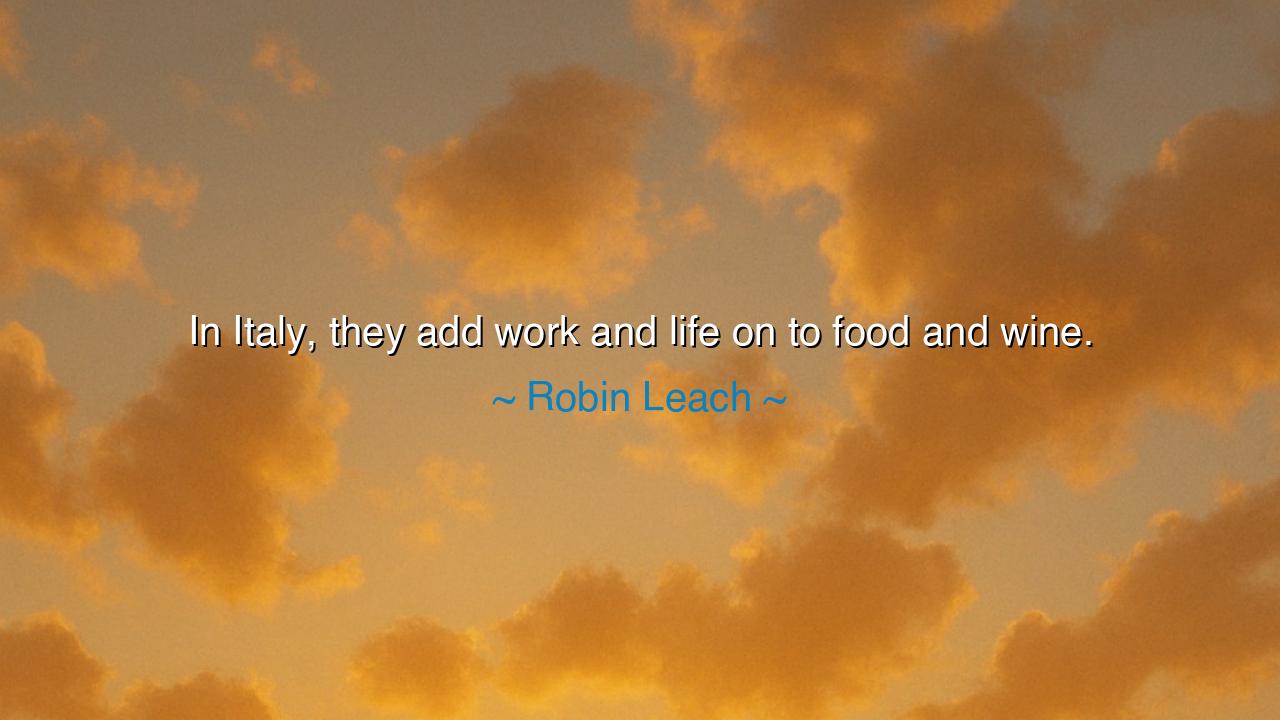
In Italy, they add work and life on to food and wine.






Hear, O listener, the words of Robin Leach, who once declared: “In Italy, they add work and life on to food and wine.” At first these words appear as a lighthearted observation of a traveler who admired the Italian way of living. Yet within them lies a truth as ancient as Rome itself: that the table is not merely a place of eating, but the very heart of existence. For in Italy, as in the wisdom of old, food and wine are not the accessories to life—they are the foundation, and work and life are woven around them like garments around the body.
The ancients knew that bread and wine were more than sustenance; they were symbols of fellowship, joy, and divine blessing. Among the Romans, the feast was both civic and sacred, a gathering of families, friends, and even strangers, where stories were told and bonds were strengthened. The Greeks too saw the symposium not as idle drinking but as a place where poetry, philosophy, and music mingled with the cup. Thus, Robin Leach’s words echo an inheritance stretching back through centuries: the sacred centrality of the table.
To say that Italians “add work and life” to meals is to proclaim that eating and drinking are not interruptions in the day but the very stage upon which life is enacted. The market bustle, the olive harvest, the vintner’s labor—all culminate in the meal, where both body and spirit are nourished. In other lands, meals may be hurried, swallowed in haste before returning to duty. But in Italy, food and wine are the sun, and work and life orbit around them, finding their meaning in communion, in conversation, and in joy.
Consider the story of Leonardo da Vinci, whose genius spanned both art and invention. It is told that even as he painted or sketched, he delighted in preparing simple dishes, sharing them with his apprentices, and speaking of philosophy at the table. For him, eating was not apart from labor, but an extension of it—an act that sharpened the mind, gladdened the heart, and brought his companions into harmony. Here we see the truth of Robin Leach’s words: work flows into food, life into wine, until the boundaries vanish.
There is a deep emotional wisdom here. In a world often consumed by speed and distraction, the Italian way reminds us that to pause for a meal is not weakness but strength. It is to declare that the joy of being alive outweighs the burdens of toil. The table becomes altar; the wine, a sacrament of joy; the bread, a reminder that life is best when shared. To despise or diminish this is to forget what it means to live.
O listener, the lesson for you is clear: let not your days be swallowed by endless work and restless striving. Do not treat food as mere fuel, nor wine as mere indulgence. See them instead as anchors of your existence, as moments where your humanity is restored. When you eat, do so with presence. When you drink, let it be with gratitude. Invite others to your table, and let life itself be flavored by the fellowship you create.
Practical action follows: slow your meals, honor your food, and make of them a time of renewal. If possible, share them with friends or family, even if only once a day. Speak not only of tasks, but of dreams and stories. In this way, you will taste what Robin Leach saw in Italy—that life itself, when bound to food and wine, becomes richer, warmer, and more enduring.
Thus I say: cherish the wisdom of the Italian table. For it teaches us that work is fleeting, but bread endures; that duties pass, but shared wine lingers in memory. To live fully is to feast not only with the body, but also with the soul. And those who learn this will know a joy that no hunger, no toil, no sorrow can ever take away.






AAdministratorAdministrator
Welcome, honored guests. Please leave a comment, we will respond soon